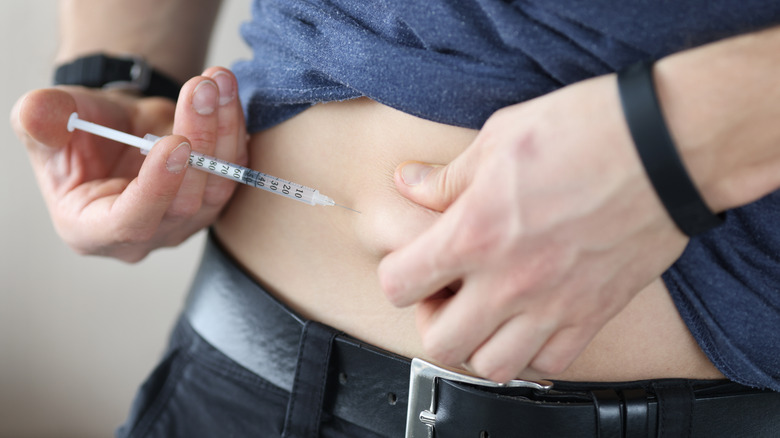How Diabetes Presents Differently In Men Versus Women
Diabetes is a disease that impacts the body's ability to process blood sugar, according to the Centers for Disease Control and Prevention (CDC). Normally, the body breaks down glucose from food sources in the presence of a pancreatic hormone called insulin. In diabetics, this hormone is either insufficient or doesn't function properly. Diabetes shows up differently in people, usually depending on their weight, health history, dietary habits, sleeping patterns, and even gender. There are three types of diabetes, per the International Diabetes Federation (IDF).
Type 1 diabetes is an autoimmune condition in which the body doesn't produce insulin or makes too little of it. It primarily affects children and adolescents, but the signs may emerge later as you age. Type 2 diabetes occurs when the body doesn't know how to manage the insulin it naturally produces very well. In fact, the insulin your body produces can cause high amounts of sugar in the bloodstream. Additionally, it does makeup about 90% of all diabetes cases. The third kind is gestational diabetes, which is comprised of high blood sugar during pregnancy.
How is diabetes different in males and females?
When it comes to symptoms of diabetes, the condition manifests with slight variations in both males and females. According to News Medical, most indications of diabetes are similar in men and women. For instance, people with high blood sugar often feel thirsty, dizzy, pee frequently, and may even lose weight, regardless of gender.
However, the differences mainly lie in the risk factors and diabetic complications. A study in 2016 discovered that globally, more males are prone to high blood sugar disease than women. In 2013 alone, there were 14 million times more males with diabetes than females. In another 2020 study published in Diabetologia, scientists found that women who have entered the menopause phase or have ovarian issues are more likely to develop Type 2 diabetes. In fact, women who undergo estrogen therapy have a better chance of fighting diabetes symptoms. This indeed does confirm that diabetes has a strong relation with sex hormones.
But despite women being more active in managing their diabetes, research shows that they experience increased complications when it comes to the heart and kidneys (via MedicalNewsToday). In addition, diabetic women are at a higher risk of developing depression and anxiety because of the disease.


